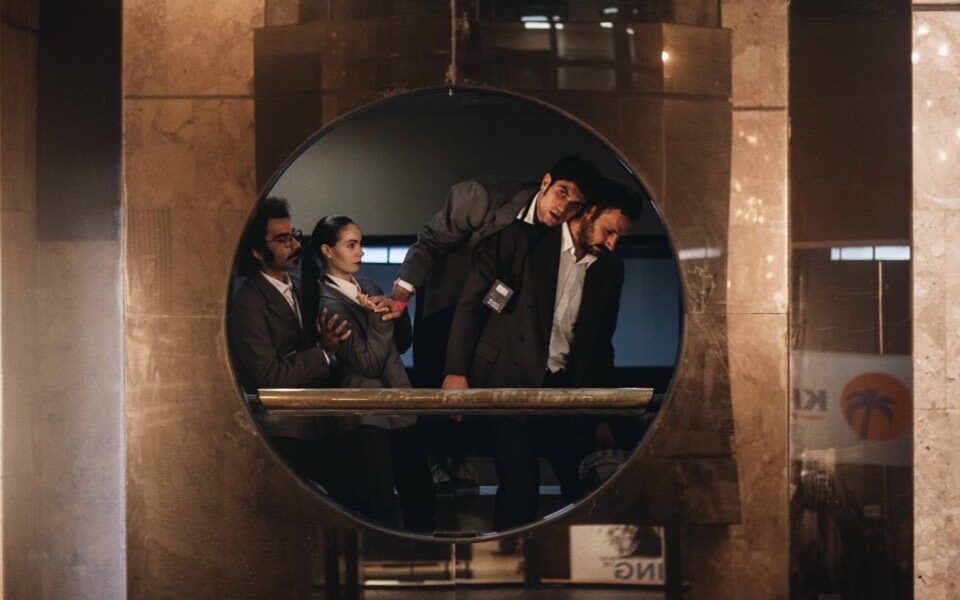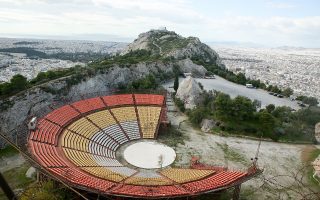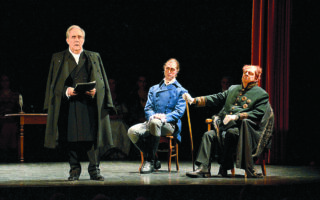The millennial at the helm of the National’s Experimental Stage

“Yes, We Can’t,” a play by Marilena Katranidou exploring today’s “burnout society,” launched the new season at the Greek National Theater’s Experimental Stage for Emerging Artists on November 8, embodying the intentions of the theater’s new artistic director. “We want to embrace diversity and give visibility and a platform to people and stories who are often absent from the public debate,” Katerina Giannopoulou wrote in a note at the presentation of the new season’s program at the National.
 “My chief interest is in making space on the stage for stories and people who are underrepresented in the mainstream narrative,” Giannopoulou, the first woman to be appointed to the helm of the Experimental Stage, tells Kathimerini, reiterating her plans.
“My chief interest is in making space on the stage for stories and people who are underrepresented in the mainstream narrative,” Giannopoulou, the first woman to be appointed to the helm of the Experimental Stage, tells Kathimerini, reiterating her plans.
She explains that even though public discourse tends to overlook people from different cultural and economic backgrounds, representation and inclusion are key motifs in contemporary theater. “If we go to the trouble of thinking about what stories we tell and how these shape society, we can also change it,” she adds.
‘Every performance is an opportunity to try something new, to make a new discovery’
Apart from “Yes, We Can’t” (which was not played last season because of sit-in protests at the venue), this season’s program at the National Theater’s Experimental Stage also includes Evdoxia Androulidakis’ “Baton Sale,” in which five women from completely different walks of life are “interviewed” over a Sunday afternoon coffee; and Sofia Mavragani’s “Dance: We Are Here Prepared for Tragedy,” a performance blending the formats of lecture, dance, concert and theater to comment on those of life’s tragedies that are worth living and those that are not.
Experimental theater is by no means new, but we ask Giannopoulou what the challenges are today and how these are affected by the company’s state-run status.
“In my book, experimental means unexpected combinations of things, trying to surprise the audience and even oneself,” she says. “Every performance is an opportunity to try something new, to make a new discovery. There are so many different ways of storytelling and performing that there is simply too much to choose from, especially considering how much technology can contribute and how much the postdramatic approach has changed the performing arts. A state-run theater company must provide artists with all these possibilities, it must support their vision and it must be ready to accept the new.”
A graduate of the Athens Conservatory School of Dramatic Arts, 36-year-old Giannopoulou has directed, among others, Albert Camus’ “The Just Assassins” at the Piraeus Municipal Theater earlier this year and Rainer Werner Fassbinder’s “In a Year with 13 Moons” at the 2021 Athens Festival.
“I only recently realized that all the pieces I choose to stage are about the end of the world or the end of an era of romance that is forever lost, leaving its heroes in a state of futility, unable to do anything other than wait for the end,” she tells Kathimerini, adding that most of her influences come from cinema, but also from the likes of stage directors Frank Castorf, Christoph Marthaler and Rene Pollesch, with whom she has worked in Germany.
This fascination with the end of eras is probably why she has chosen to direct a play about her own beleaguered generation, millennials, for this season at the Experimental Stage. Based on a series of interviews with young men and women in different parts of Europe, “Generation Lost” was written by Grigoris Liakopoulos in the context of a special program run by the Goethe Institute in Thessaloniki.
“We tried to write a manifesto for the millennials or, rather, an anti-manifesto, as we want to bring this generation face to face with its problems,” comments the director, who says that her approach is inspired, among others, by Allen Ginsberg’s poem “Howl.”
“Millennials, like every generation before and after them, are rife with contradictions. They are at once privileged and wronged, disappointed and optimistic. It is a lost generation that is trying to define its future,” says Giannopoulou.
The director is honored to be the first woman to be appointed artistic director of the Experimental Stage and hopes that more and more women will end up in these positions, “so it no longer has to be an issue.”
“I think some progress is being made in this direction, but we can always do better,” she says.




